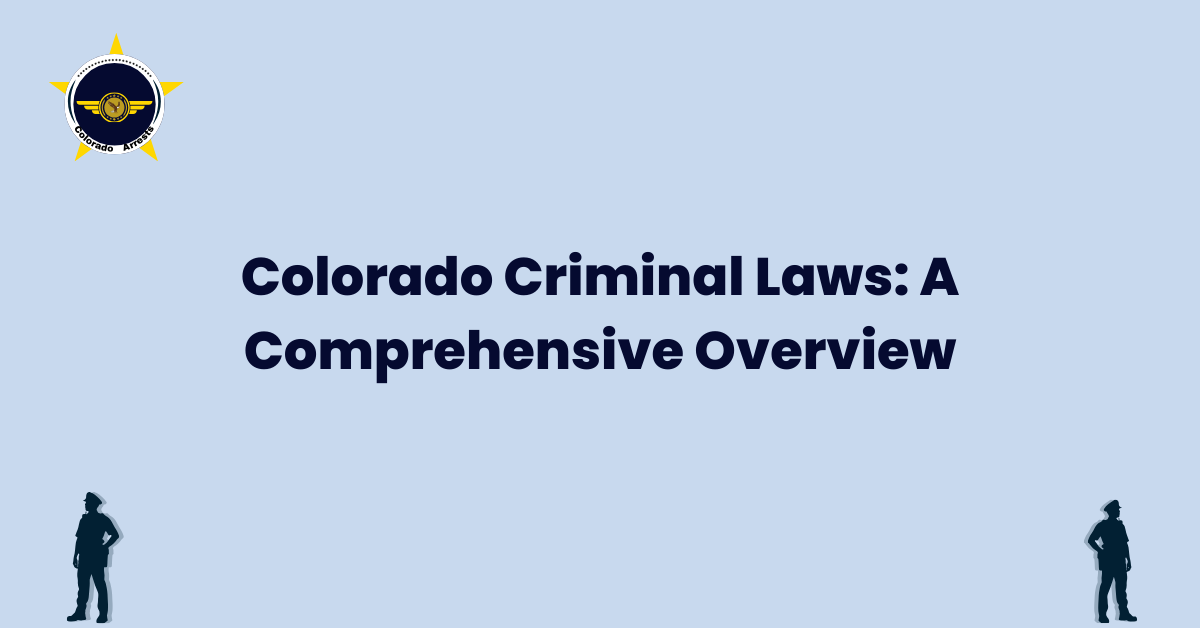Colorado Criminal Laws A Comprehensive Overview
Are you curious about the laws that govern criminal behavior in the beautiful state of Colorado? Look no further! In this comprehensive overview, we will delve into the intricacies of Colorado’s criminal laws, providing you with a wealth of information to satisfy your curiosity.
From understanding the different types of criminal offenses to exploring the penalties and consequences that accompany them, this guide will take you on a journey through Colorado’s legal system. Whether you are a law student, a concerned citizen, or simply someone with a thirst for knowledge, this overview will equip you with a solid understanding of Colorado’s criminal laws.
Types of Criminal Offenses in Colorado
In Colorado, criminal offenses are categorized into various types, each with its own set of laws and regulations. Understanding these different categories is crucial in comprehending the legal landscape of the state.
Felonies
Felonies are serious crimes that carry severe penalties. They include offenses such as murder, rape, and armed robbery. Committing a felony in Colorado can result in lengthy prison sentences and hefty fines.
Misdemeanors
Misdemeanors are less severe offenses compared to felonies but still carry legal consequences. Examples of misdemeanors include petty theft, simple assault, and driving under the influence. The penalties for misdemeanors can include fines, probation, and short term imprisonment.
Traffic Violations
Colorado’s criminal laws also encompass traffic violations. These include speeding, reckless driving, and running a red light. While traffic violations are typically considered less serious, repeat offenses can lead to license suspension and other legal repercussions.
Penalties and Consequences
The penalties and consequences for criminal offenses in Colorado vary depending on the severity of the offense and the defendant’s criminal history. It is essential to understand the potential repercussions of engaging in criminal behavior.
Fines
One common consequence of criminal offenses is the imposition of fines. The amount of the fine varies based on the offense committed. Fines serve as a financial deterrent and aim to discourage individuals from engaging in unlawful activities.
Probation
Probation is a period of supervision imposed by the court as an alternative to incarceration. It typically involves regular check ins with a probation officer and adherence to specific conditions, such as attending counseling or abstaining from drug use.
Imprisonment
For more severe offenses, imprisonment is often the primary consequence. The length of imprisonment depends on the offense committed and can range from a few months to life in prison. Incarceration aims to protect society from dangerous individuals and provide a form of punishment and rehabilitation.
Additional Considerations
When exploring Colorado’s criminal laws, it is important to keep in mind that specific circumstances and details can influence the outcome of a case. Factors such as intent, prior criminal history, and the presence of aggravating or mitigating circumstances can impact the severity of penalties.
Aggravating Factors
Aggravating factors are circumstances that make an offense more severe. These can include the use of a weapon, causing serious bodily harm, or committing the offense while under the influence of drugs or alcohol. Aggravating factors can lead to enhanced penalties.
Mitigating Factors
Mitigating factors, on the other hand, are circumstances that may lessen the severity of an offense. These can include a defendant’s lack of criminal history, cooperation with law enforcement, or evidence of remorse. Mitigating factors can sometimes result in reduced penalties.
By delving into the intricacies of Colorado’s criminal laws and familiarizing yourself with the different types of offenses, penalties, and additional considerations, you can gain a comprehensive understanding of the legal system in the state. Whether you are a law student, a concerned citizen, or simply curious about the laws that govern criminal behavior, this overview provides a valuable resource for expanding your knowledge.
FAQs
What are the different types of criminal offenses in Colorado?
In Colorado, there are several categories of criminal offenses, including but not limited to
Felonies: These are the most serious offenses and typically carry severe penalties such a imprisonment for more than one year.
Misdemeanors: These are less serious offenses compared to felonies and are typically punishable by imprisonment for up to one year.
Petty Offenses: These are minor offenses that are usually punishable by fines or community service.
Traffic Violations: These include offenses such as speeding, reckless driving, and driving under the influence (DUI).
What are the penalties for committing a criminal offense in Colorado?
The penalties for criminal offenses in Colorado vary depending on the severity of the offense. Some common penalties include
Imprisonment Offenders may face imprisonment ranging from a few months to several years, depending on the offense.
Fines Offenders may be required to pay fines, which can range from a few hundred dollars to thousands of dollars.
Probation In some cases, offenders may be placed on probation, which involves regular check ins with a probation officer and adherence to certain conditions.
Community Service Offenders may be required to complete a certain number of community service hours as part of their sentence.
What is the process of charging and prosecuting a criminal offense in Colorado?
The process of charging and prosecuting a criminal offense in Colorado typically involves the following steps
Investigation Law enforcement agencies investigate the alleged offense, collect evidence, and interview witnesses.
Arrest If there is sufficient evidence, the suspect may be arrested and taken into custody.
Charging The prosecutor reviews the evidence and decides whether to file formal charges against the suspect.
Arraignment The suspect is brought before a judge, informed of the charges, and enters a plea.
Trial If the case goes to trial, both the prosecution and defense present their arguments and evidence before a judge or jury.
Sentencing If the suspect is found guilty, the judge imposes the appropriate sentence based on the severity of the offense and other factors.
What are the rights of individuals accused of a criminal offense in Colorado?
Individuals accused of a criminal offense in Colorado have certain rights, including
The right to remain silent Individuals have the right not to incriminate themselves and can choose not to answer questions from law enforcement.
The right to legal representation Individuals have the right to an attorney, and if they cannot afford one, the court will appoint a public defender.
The right to a fair trial Individuals have the right to a trial by jury and to be presumed innocent until proven guilty beyond a reasonable doubt.
Can criminal records be expunged in Colorado?
Expungement of criminal records in Colorado is possible, but it depends on various factors such as the type of offense, the time since the offense, and the individual’s criminal history. Certain offenses, such as violent crimes and sexual offenses, are generally not eligible for expungement.
It’s important to consult with an attorney to determine eligibility and navigate the expungement process.
Where can I find more information about Colorado’s criminal laws?
For more detailed information about Colorado’s criminal laws, it is recommended to consult the official Colorado Revised Statutes (C.R.S.) or seek legal advice from a qualified attorney. Additionally, the Colorado Judicial Branch website provides resources and information related to the state’s legal system.







